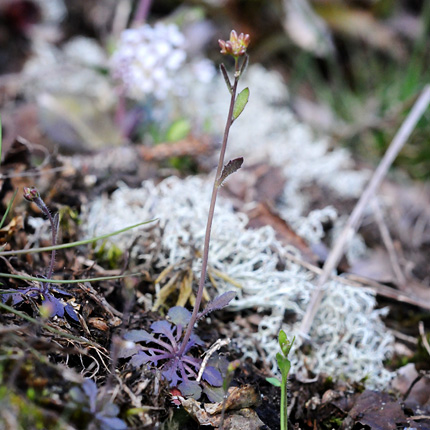Molecular evolution of the allotetraploid species Arabidopsis suecica
Project code: NO 942/1-1

Arabidopsis suecica about to flower (Photographer: Svante Holm)
While new species are usually formed through a gradual evolutionary process, they can also arise almost instantaneously, through events that involve severe genetic bottlenecking and loss of variability. Despite a very narrow genetic basis, such species can be remarkably successful. An important question is therefore how they manage to diversify and adapt to new habitats. This project aims to address this problem by studying very young plant species that underwent such bottlenecks: Arabidopsis suecica is in the same genus as the model plant Arabidopsis thaliana and originated as an interspecific hybrid between A. thaliana and A. arenosa. Modern sequencing technologies will be used to elucidate the patterns of variability in these species, both at the level of genomic DNA polymorphisms and in the transcribed portion of the genome, and to compare it to the ancestral species. In addition, functional and fitness studies will be initiated.
Publications related to the project
- Slotte T, Hazzouri KM, Ågren JA, Koenig D, Maumus F, Guo YL, Steige K, Platts AE, Escobar JS, Newman LK, Wang W, Mandáková T, Vello E, Smith LM, Henz SR, Steffen J, Takuno S, Brandvain Y, Coop G, Andolfatto P, Hu TT, Blanchette M, Clark RM, Quesneville H, Nordborg M, Gaut BS, Lysak MA, Jenkins J, Grimwood J, Chapman J, Prochnik S, Shu S, Rokhsar D, Schmutz J, Weigel D, Wright SI. (2013) The Capsella rubella genome and the genomic consequences of rapid mating system evolution. Nat Genet. 2013 Jul;45(7):831-5.


- Debieu M, Tang C, Stich B, Sikosek T, Effgen S, Josephs E, Schmitt J, Nordborg M, Koornneef M, de Meaux J. (2013) Co-variation between seed dormancy, growth rate and flowering time changes with latitude in Arabidopsis thaliana. PLoS One. 2013 May 23;8(5):e61075.






